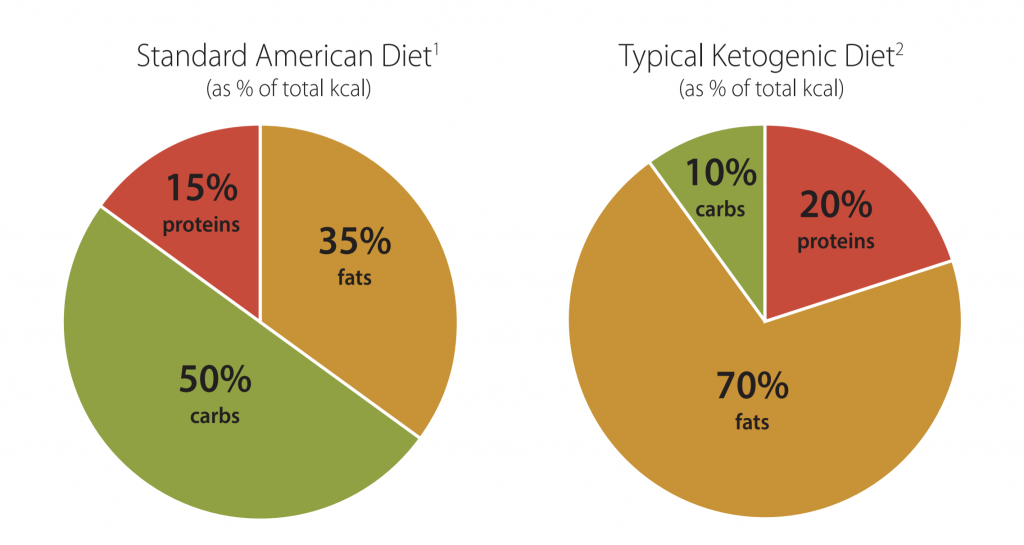We’ve been discussing a number of ways that you can help support your best cognitive health the past few weeks. With proper brain function, you can be more equipped to live the happy and healthy life that you desire. In this series, we have discussed the importance of nutrition for your cognitive health as well as the impact that lifestyle has on your overall wellbeing. Furthermore, we have shared how to use the Kirtan Kriya meditation to improve brain performance as well.
Today we dive into the many benefits of the ketogenic diet on your brain health.
What Is The Ketogenic Diet?
Have you heard of the ketogenic diet? You may have heard of it as the “Keto Diet.” At its core, this is a low carb diet, but it is also so much more.
Instead of carbs, it is centered on high quality proteins and fats. When you eat less carbs, your body is better equipped to enter a state that is more naturally print to breakdown fats (from your food and your body) which then results in ketones as you enter a state known as “ketosis.”
Most people are in a state where their primary form of energy is from carbs (glucose). However, for those who are in a steady state of ketosis, that primary fuel source switches from glucose to ketones. In other words, when successfully following a keto diet, your brain and organs will use ketones as their primary energy source.
How Do I Know If I Am “In Ketosis”?
You can measure ketones in your blood and urine to ensure that your body is staying in ketosis on the ketogenic diet.
A Ketogenic Meal
On the traditional ketogenic plate, 10% of calories will come from healthy carbs (ie: leafy greens, nonstarchy vegetables, and limited amounts of legumes and berries). Then 20% of calories will come from high quality proteins (ie: omega-3-rich wild-caught fish and
grass-fed/grass finished animal protein). The last 70% or so of calories will come from high quality healthy fats (ie: avocado,
unsaturated and medium-chain triglyceride oils, nuts and seeds, and coconut). This 10/20/70 keto suggestion includes all your drinks, snacks, and meals for each day. You are unique, so your macronutrient distribution may vary based of your health, physical activity, and practitioner’s expertise.
It is essential to remember that calorie size isn’t the same thing as physical size. For example, even though healthy fats is about 70% of your total plate, that doesn’t mean you’ll have a salad that is 70% filled with nuts and seeds, with only a few sprigs of lettuce. It is based off the total calorie content. For a handy tool to figure out the calories behind the foods you eat, download the free app My Fitness Pal. You can even make goals based on your macronutrient content such as the Keto 10/20/70 suggestion- and My Fitness Pal will help you meet those goals too! Great, right?
Check out this image below to see how the Ketogenic Diet differs from the Standard American Diet (SAD).
The Benefits:
There are many benefits to being on a ketogenic diet. The most common benefits include weight loss, an increase in brain
performance, balanced blood sugar, and improved cardiovascular health.
Mental focus is improved with the ketogenic diet because the brain uses ketones instead of glucose as a source of fuel. Studies show that this switch can actually help the brain to grow more nerve factors and synaptic connections between brain cells. The benefit for you? More alertness, a better focus, and better cognitive abilities. Balanced blood sugar is promoted through the intake of less carbohydrates because this supports insulin metabolism in the body. Furthermore, the absence of carbs from the diet helps the body to focus on breaking down proteins and fats. When on a reduced calorie ketogenic diet, one can experience weight loss and it can also help to reduce cravings and suppress appetite. While carbs may help to increase energy during a workout, they are not the best form of energy for a smooth clean burn that lasts all day. Alternatively, in ketosis, the brain has a consistent stream of ketones to supply the body with increased performance. Lastly, a ketogenic diet supports optimal metabolism and cardiovascular health because it is shown to help blood lipid and fatty acid metabolism.
How To Begin
To start, you want to focus on simply reducing your net carbs to less than 50 grams a day. Be mindful to explore the variety of carbs that come from leafy greens, non-starchy vegetables, and limited amounts of legumes and berries. Using an app like My Fitness Pal will automatically calculate your daily carbs for you. This list here has a comprehensive amount of ideas to try when first starting the keto diet: Keto Food List.
Some of our favorite recipe blogs to get started with the Keto Diet:
Keto Adaptation
As you begin the keto diet, you may notice some changes in your body. Be aware that it may take the body about 2-4 weeks to switch from burning fat as fuel as opposed to carbohydrates. For some people, this can leave you with a feeling similar to the flu. Symptoms may include feeling achy, nauseous, a sense of withdrawal, or drowsy. If you experience this, don’t be alarmed. The switch from burning fat instead of glucose is a revolutionary transition for your body. This starts for some people a few days after being on a ketogenic diet and it typically ends one or two weeks later. Then you’ll start feeling all the positive effects of the new diet.
If you’re facing a challenging keto adaptation, try this tips: drink more water, increase consumption of electrolytes (be mindful to avoid those sweet “sports” drinks), eat more healthy fats, participate in more exercise, sleep more, try an exogenous salt supplement, and practice stress reduction/ mindfulness activities.
In Summary
There are so many benefits to being on a keto diet. Many people love it and feel that it has forever transformed their life for the better. Of course, it is important to note that everyone is different and that there is no one-size-that fits all. While some people may be the ideal candidate for a keto diet, others are not. Thus, it is important to work with a qualified healthcare practitioner who can assess your digestive health, blood sugar, brain health, and overall metabolic state to support you in your quest for a life of health and happiness.
We hope that this information is useful for you on your journey for the best cognitive health. If you’d like personal support in this process please click here to learn more about our Happy Health Brain Longevity Program. Also, be sure to check out our entire series on cognitive health by clicking the links below:
Guide To Boosting Your Cognitive Health Part 1: Nutrition
Guide To Boosting Your Cognitive Health Part 2: Lifestyle Tips
Guide To Boosting Your Cognitive Health Part 3: Kirtan Kriya
Guide To Boosting Your Cognitive Health Part 4: The Ketogenic Diet
Guide To Boosting Your Cognitive Health Part 5: Is your blood sugar affecting your brain?
PS: You are invited to click here to sign up for our free 14 Days to Health Video Series and to join our Facebook group for personal support: The Happy Health Community.
References:
- Freedman MR, King J. Kennedy E. Popular diets: a scientific review. Obes Res 2001; 9(supp 1):3S,11S,12S.
- Volek, JS, et al. Comparison of energy-restricted very low-carbohydrate and low-fat diets on weight loss and body compositionin overweight men and women. Nutr Met. 2004 Nov;1:13.
- Meyer J. The Ketogenic Diet and Mental Performance.Available at: http://blog.prymd.com/the-ketogenic-diet-and-mental-performance. Accessed September 13, 2017.
- D’Anci KE, Watts KL, Kanarek RB, Taylor HA. Low-carbohydrate weight-loss diets. Effects on cognition and mood. Appetite. 2009Feb;52(1):96-103.
- Yancy Jr. WS, et al., A low-carbohydrate, ketogenic diet to treat type 2 diabetes. Nutrition & Metabolism 2005; Dec 1; 2:34.
- Brinkworth GD, et al., Long-term effects of a very low-carbohydrate diet and a low-fat diet on mood and cognitive function.Archives Internal Medicine 2009; 169(20):1873-1880.
- Volek et al. Body composition and hormonal responses to a carbohydrate-restricted diet. Metabolism 2002;51(7):864-70.
- Yancy Jr WS, et al. A low-carbohydrate, ketogenic diet versus a low-fat diet to treat obesity and hyperlipidemia: a randomized,controlled trial. Ann Intern Med 2004;140(10):769-77.
- Gibson AA, et al., Do ketogenic diets really suppress appetite? A systematic review and meta-analysis. Obes Rev. 2015; 16:64-76.
- Volek J.S., et al. Metabolic characteristics of keto-adapted ultra-endurance runners. Metabolism. 2016 Mar;65(3):100-10.
- Adam-Perrot A, et al. Low-carbohydrate diets: nutritional and physiological aspects. Obes Rev. 2006;7(1)49.58.
- Volek, JS., and Stephen D. Phinney. The Art and Science of Low Carbohydrate Living. Beyond Obesity LLC., 2011.
- Hudgins LC. Effect of high-carbohydrate feeding on triglyceride and saturated fatty acid synthesis. Proc Soc Exp Biol Med. 2000Dec;225(3):178-83.
- Hudgins LC, et al. Relationship between carbohydrate-induced hypertriglyceridemia and fatty acid synthesis in lean and obesesubjects. J Lipid Res. 2000 Apr;41(4):595-604.
- Keogh JB, et al. Effects of weight loss from a very-low-carbohydrate diet on endothelial function and markers of cardiovasculardisease risk in subjects with abdominal obesity. Am J Clin Nutr. 2008 Mar; 87(3):567-76. correct
- Krebs NF, et al. Efficacy and safety of a high protein, low carbohydrate diet for weight loss in severely obese adolescents. J Pediatr. 2010 Aug;157(2):252-8. doi: 10.1016/j.jpeds.2010.02.010. Epub 2010 Mar 20.







